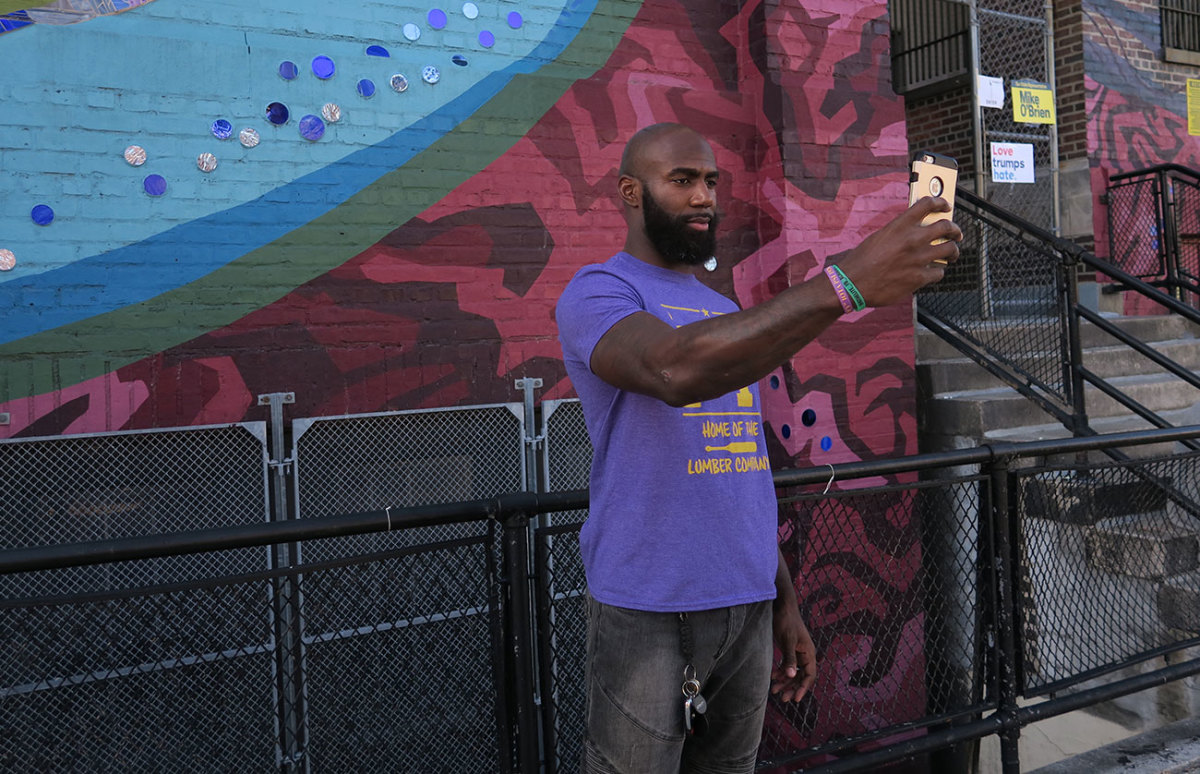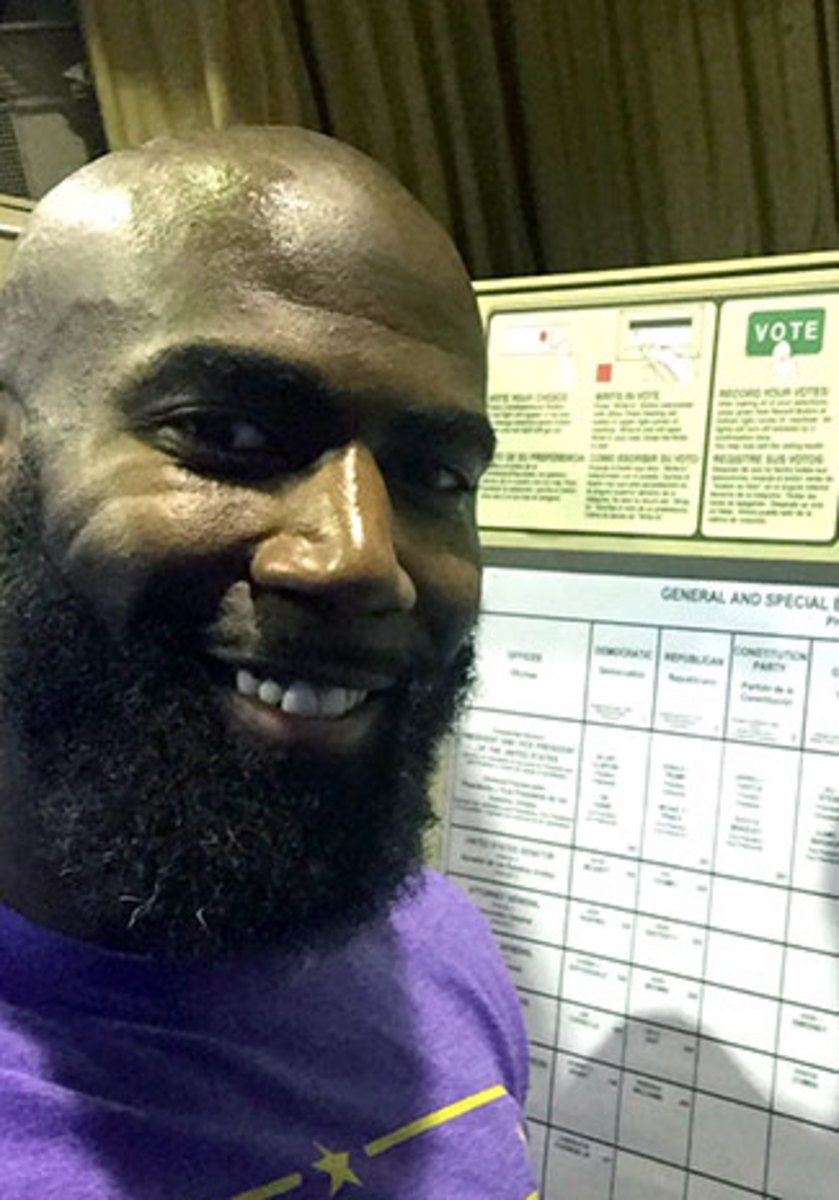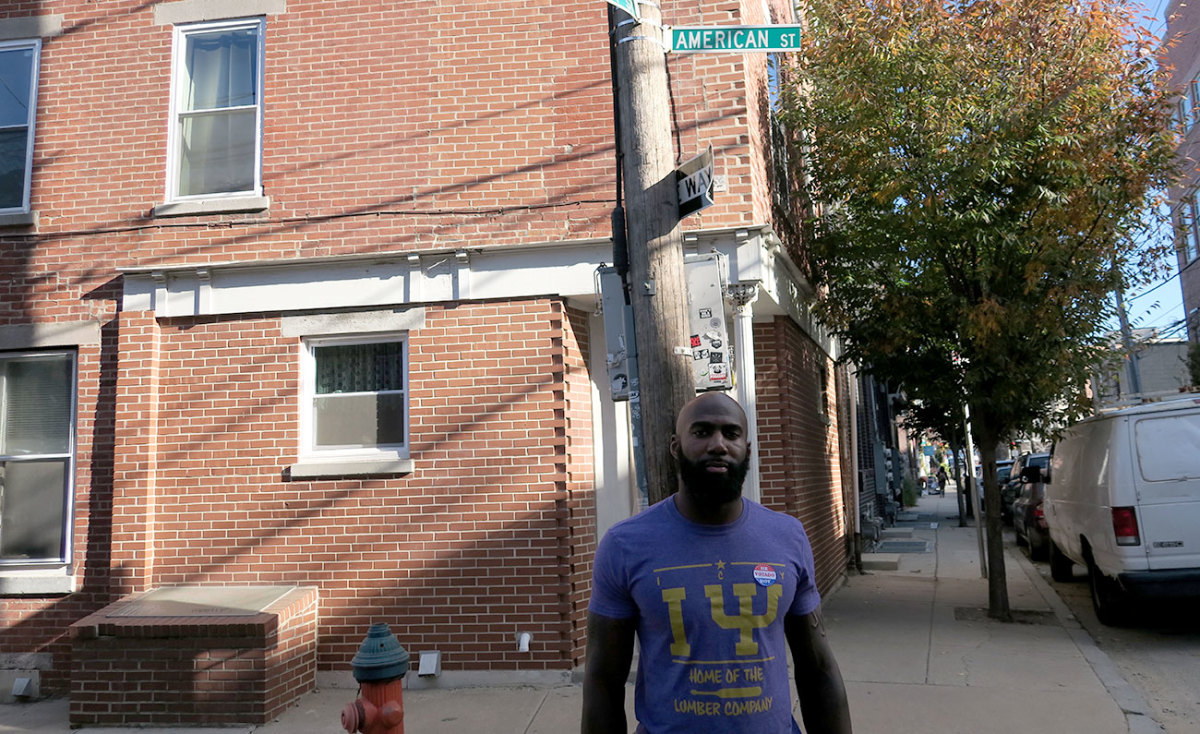An Eagle Casts His Vote

PHILADELPHIA — Election Day dawned sunny and unseasonably warm in the birthplace of American democracy, an important battleground state in the contentious 2016 election. Malcolm Jenkins had long planned on voting for Hillary Clinton, but as he drove to the Eagles training facility for morning meetings, he found himself rethinking his decision. Just a few hours remained until he would enter the voting booth, and Jenkins had a classic case of cold feet. “This morning I had a little bit of stage fright,” the Eagles safety said. While he ate breakfast before the first meeting at 8:15 a.m., Jenkins scrolled through Google’s 2016 election platform, last-minute researching the views of the presidential candidates on the ballot that he was less familiar with, Green Party candidate Jill Stein and libertarian candidate Gary Johnson. “But then I thought, if I vote for them, they aren’t going to win, so that is almost the equivalent of not voting,” Jenkins says.
Tuesdays are half-days for the Eagles, and as Jenkins got into his car at 1 p.m. to stop home before heading to his polling place, he made up his mind, again. “I just decided I am going to vote Hillary,” he said reluctantly, as he merged onto I-95 South. “But Hillary doesn’t have my full support. This is more so a vote against Trump than it is for Hillary.”
African-Americans make up half of Philadelphia’s voters and were instrumental in supporting Barack Obama in 2008 and 2012. “For Obama, there was just a lot of enthusiasm in the minority communities to get out and vote. Everybody felt like their vote mattered,” Jenkins says. “This one is different because I don’t think Hillary has the full support of everybody. A lot of people are feeling like, Oh, I just won’t vote or I’ll vote for somebody else. Usually all of the swing states are based on the minority vote. If the minorities come out in the masses and vote, they usually swing Democratic. If not, they will swing Republican. That is what makes this whole race pretty interesting and closer than people actually would like.”

Clinton didn’t have Jenkins’ full support because of her backing of the 1994 federal crime bill signed into law by President Bill Clinton. The bill was meant to crack down on the growing violent crime rate and to increase prison funding, but critics say it fueled mass incarceration and disproportionately affected minorities. “I’m still caught up in that,” said Jenkins, who recently did a ride-along with Philadelphia police to better understand community-police relations. “The crime bill basically incentivized the prison system. There were quotas, mandatory minimums, you have to serve 85 percent of your time, so it is guaranteeing that bodies will always be locked up. And that went mostly towards minority communities and poor communities where crime is more rampant.”
Jenkins pulled into his garage to meet up with his wife, Morissa. The two set off on foot to their polling place, Bodine High School on 4th and George Street in Philadelphia’s Northern Liberties neighborhood. As they walked through Liberty Lands park, the conversation turned to the election’s impact on the NFL locker room, where Jenkins said political discussions had ramped up over the past few weeks.

Taxes, he said, were an issue top of mind for most players, who are some of the country’s highest-paid workers, but have short careers and minimal job security. “I could easily vote for things that benefit me taxwise, but the rest of my family is not in this tax bracket,” Jenkins said. “So when I vote I try to keep in mind my family and my community and what I think is best for the nation as a whole.”
He said many of his teammates felt the same way, unsatisfied with either candidate and dreading a choice of the lesser of two evils. “Whether they want to vote for Hillary or Trump, the guys really don’t want to vote for either,” Jenkins said. “It is just to the point where you almost don’t want to vote. Nobody is looking forward to it.”
Jenkins and Morissa arrived at Bodine High’s auditorium, where there was no line to vote. They walked down the creaky wooden floors, signed in and headed behind the blue curtains of the voting booth. When Jenkins emerged from the booth, he signed an autograph for Chastity Fogel, a local judge who recognized his distinctive shaved head and well-groomed beard. He grabbed a sticker before heading out of the room. A rush of early voters that day (Roots drummer QuestLove was rumored to have voted there) meant that only Spanish language stickers were left. Jenkins put the sticker on his purple T-shirt. It reads, HE VOTADO HOY.
Since Week 2 of this season, Jenkins has raised his fist while the national anthem plays, a symbolic gesture to bring awareness to racial injustice. As he walked down the stairs from the school, he was stopped by an Eagles fan who recognized him. The man, who was white, told Jenkins he respected his anthem protest and thought it was important that he was making the statement against police brutality and oppression of minorities.
The views that motivated him to raise his fist every Sunday played a large role in determining his vote on Tuesday. “Trump started talking about bringing back stop-and-frisk, which was ruled unconstitutional,” Jenkins said. “And as a black man, that was the last thing I wanted to hear. That you will basically pass laws to say that I can be profiled and it is legal.”
When asked about a racial split in political preferences in the locker room, Jenkins said he didn’t know of any black teammates who were voting for Trump. The majority of his white teammates are Republican, he says, but Jenkins guessed only one or two of those players were true Trump supporters. The rest were holding their nose and voting Trump, or voting for Hillary instead.
Two teammates told Jenkins they were considering not voting, because they didn’t’ want to feel responsible for the actions of either candidate. “But at the end of the day just because you didn’t cast your vote, your silence is still a nod for whatever happens,” Jenkins said. “You did vote—you voted to let everybody else decide for you.”

Jenkins says this contentious election was difficult to broach in the locker room. He avoided discussing it with known Trump supporters. But 2012’s Romney vs. Obama election was a different story. “That one was actually a lot easier to talk politics in the locker room,” he says. “You didn’t have to talk about racial divide or hate. It was just all about the facts and depended on what benefited you or your family. There were some heated debates, but the conversation was more about money, and they were a lot more open than these ones are.”
After leaving the polling place, Jenkins crossed American Street. He started to reflect. “The first three times I got to vote, I voted for the first black president and the first [potential] female president, so it has been pretty historical,” he said. “If it ever gets back to two white males, it will be a very boring election, very regular. Which is crazy, because to me this is the norm, the craziness of our elections. It’s all I’ve had a chance to vote for. My parents are the complete opposite, and everybody before that, so I can’t even imagine what it will be like 30 years from now when my grandkids are getting ready to vote. We will be way beyond where we are now.”
Now that he’d marked his ballot for Clinton, Jenkins’ job was done, but he didn’t’ feel any sense of relief. “I don’t think my emotion has changed at all after I hit the button,” he said. “I am still worried, still very worried. I don’t think my decision was really what I have been worrying about this whole time. It is really the decision of the nation.”
Wednesday would bring a full day of practice, beginning at 6:30 a.m., but Jenkins planned to stay up past his regular 10 o’clock bedtime, to await the results. “I’ll be up a little late tonight,” he said. “It’s either going to be a sigh of relief or a panic.”
Question or comment? Email us at talkback@themmqb.com.
